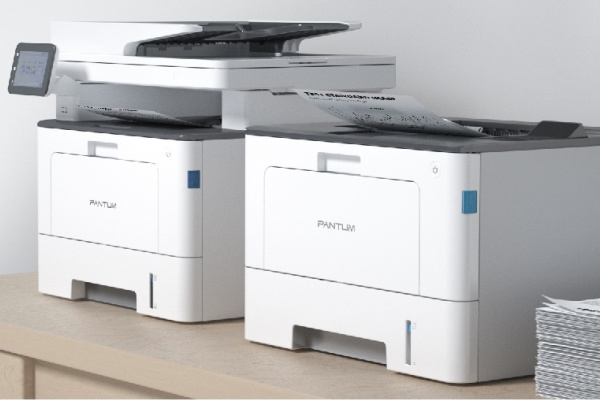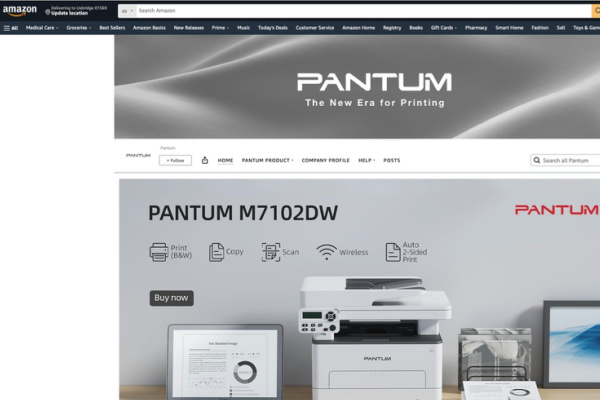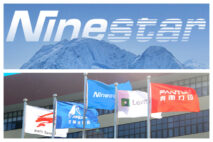On March 28, Pantum US unveiled a new line of workgroup monochrome laser machines. The new Elite Pro Series features both printers and multifunction printers (MFPs), which the firm boasts are “ideal for busy office environments where speed and productivity are paramount.”
When we learned of Pantum’s new hardware release in the United States, we were bewildered. Pantum is among the world’s biggest laser printer makers, so it is not surprising to see the company introduce new products. However, launching new machines in the United States seems to fly in the face of an embargo placed on the Chinese firm and its parent company, Ninestar Corporation, last summer by the U.S. Department of Homeland Security (DHS). The U.S. government initiated the ban after determining that Ninestar and Pantum use forced labor in their Chinese factories and had violated the Uyghur Forced Labor Prevention Act (UFLPA) (see “Ninestar Imports Banned by U.S. Government Due to Forced Labor Concerns”). Nevertheless, we continue to see lots of products from the two companies months after the embargo was announced, as we discuss below.
Elite Pro Series
The announcement on the Pantum US website indicates that the new line of monochrome machines “offers a comprehensive suite of single- and multi-function mono laser printers, equipped with advanced features tailored to enhance office efficiency.” Unfortunately, the site provides few details about the Elite Pro Series, such as the number of machines in the new line and what specifications, such as features sets and pricing, differentiate Elite Pro models. The announcement doesn’t provide any model names or alpha-numeric designators.

It appears that the new line is an enhancement to the Elite Series that Pantum launched in 2021, which included two printers and four MFPs (see “Pantum Announces Global Launch of BP5100 and BM5100 Series”). In addition to looking virtually identical to units in the older line, the new Elite Pro units match their 42 ppm print speed, although the first-page-out time for the new units is 5.9 seconds, making them a full second faster than the Elite Series models. Like the older units, the Elite Pro machines ship with standard duplex printing, and the MFP units provide a duplex automatic document feeder (DADF). The printers and MFPs in both lines accommodate a range of media, including office papers, envelopes, and index cards and have a maximum input capacity of 1,410 sheets.
According to Pantum US, the new Elite Pro units are designed to provide “seamless installation and compatibility.” Like the Elite models, they support driver-free printing for PCs running Windows as well as one-step setup for Mac systems. Elite Pro devices also can be used across multiple platforms, including ChromeOS and Linux-based environments. In terms of connectivity, the machines provide dual-band Wi-Fi connectivity and support for 802.1x, LDAP, and Kerberos protocols as well as Bluetooth. For mobile printing, they are AirPrint- and Mopria-capable and offer mobile printing with the Pantum App.
Like the Elite line, Pantum’s new Elite Pro machines employ separate drum units and toner cartridges. The firm claims the dual-component design reduces “maintenance downtime” and gives the machines an “impressive print capacity” that is “ideal for high-volume printing.” Beyond this glowing assessment, however, Pantum provided no concrete information about the Elite Pro consumables. The older Elite line accommodated 3,000-, 6,000, and 15,000-page toner cartridges along with a 30,000-page drum unit. It’s not clear if the newer devices leverage thise consumables or employ new supplies.
What about the Embargo?
Clearly, we have some questions regarding Pantum’s new Elite Pro line and the consumables used in these machines. But, as alluded to earlier, no question is larger than this: How did Pantum US manage to release a new product line in the United States given that the company and its parent are banned from importing goods into the country?
We assume that visitors to Action-Intell.com are aware of the UFLPA ban and attempts by Pantum and Ninestar to have it lifted. Suffice it to say that the firms are currently challenging the ban in a lawsuit Ninestar filed in the U.S. Court of International Trade (CIT) (see “Ninestar Sues U.S. Government for Being Added to UFLPA Entity List”). While the court has yet to issue a final determination, its rulings so far have left the embargo in place (see “Court Denies Ninestar’s Motion for an Injunction on USA’s Forced Labor Ban”).
For years, we have followed bans placed on imports by U.S. authorities. The bans we typically cover result from infringement of intellectual property like a patent or trademark. Ignoring these actions have led to dire consequences for violators such as shipment seizures and subsequent lawsuits, which we have also written about. And, in the end, most of the embargoes we have covered since the site was launched in 2009 have successfully prevented goods banned from the United States from entering the country.
The ban DHS imposed on Ninestar and its subsidiaries has been different. Ninestar and Pantum continue to operate and market products in the United States. While some of the firms’ major channel partners like Walmart have dropped certain Pantum and Ninestar products (see “Walmart.com Drops Many Ninestar Cartridges and Pantum Products”), other channel partners continue to market Ninestar and Pantum products regardless of the embargo. This is especially true online. Storefronts on Amazon, for example, feature products from both companies. When last we checked, an assortment of Pantum hardware and supplies were available at the Pantum store on Amazon.com (see below), and it featured ratings posted as recently as April 3, 2024. Likewise, some of Ninestar’s most popular online cartridge brands, including Lemero, myCartridge, InkNI, and Mytoner, also have Amazon stores. We have asked Amazon why it continues to offer a platform for Ninestar and its subsidiaries within the United States despite the ban, but Amazon has refused to provide any answers. In fact, to date, it has not returned any response whatsoever to our email. We have given Amazon weeks to respond and have sent a follow-up message.

Amazon, however, is only one example. If one Googles Pantum or any of the brands noted above, one will find some or all of them at sites large and small, including Bigbigmart.com, Ebay.com, Linfordoffice.com, Microless.com, and many others.
So, we’re puzzled. How is it possible 10 months after the United States announced the ban, that products from banned Ninestar companies remain on the market within the United States? Is the ban being ignored? That must be the case or else how could Pantum US roll out the Elite Pro line?
If you have answers, please send them to us. We’d love to understand.





